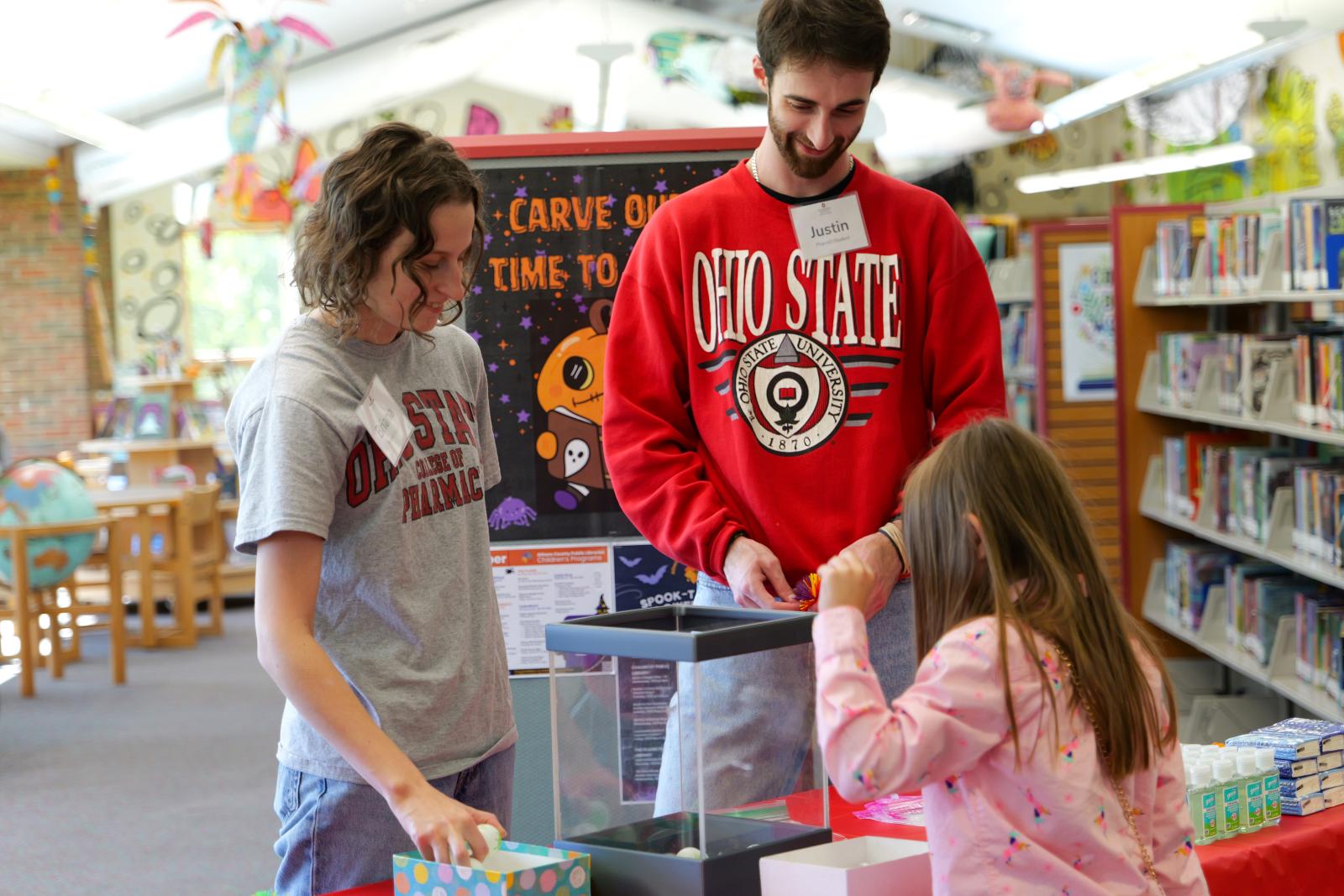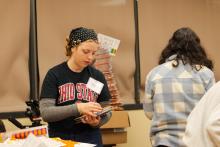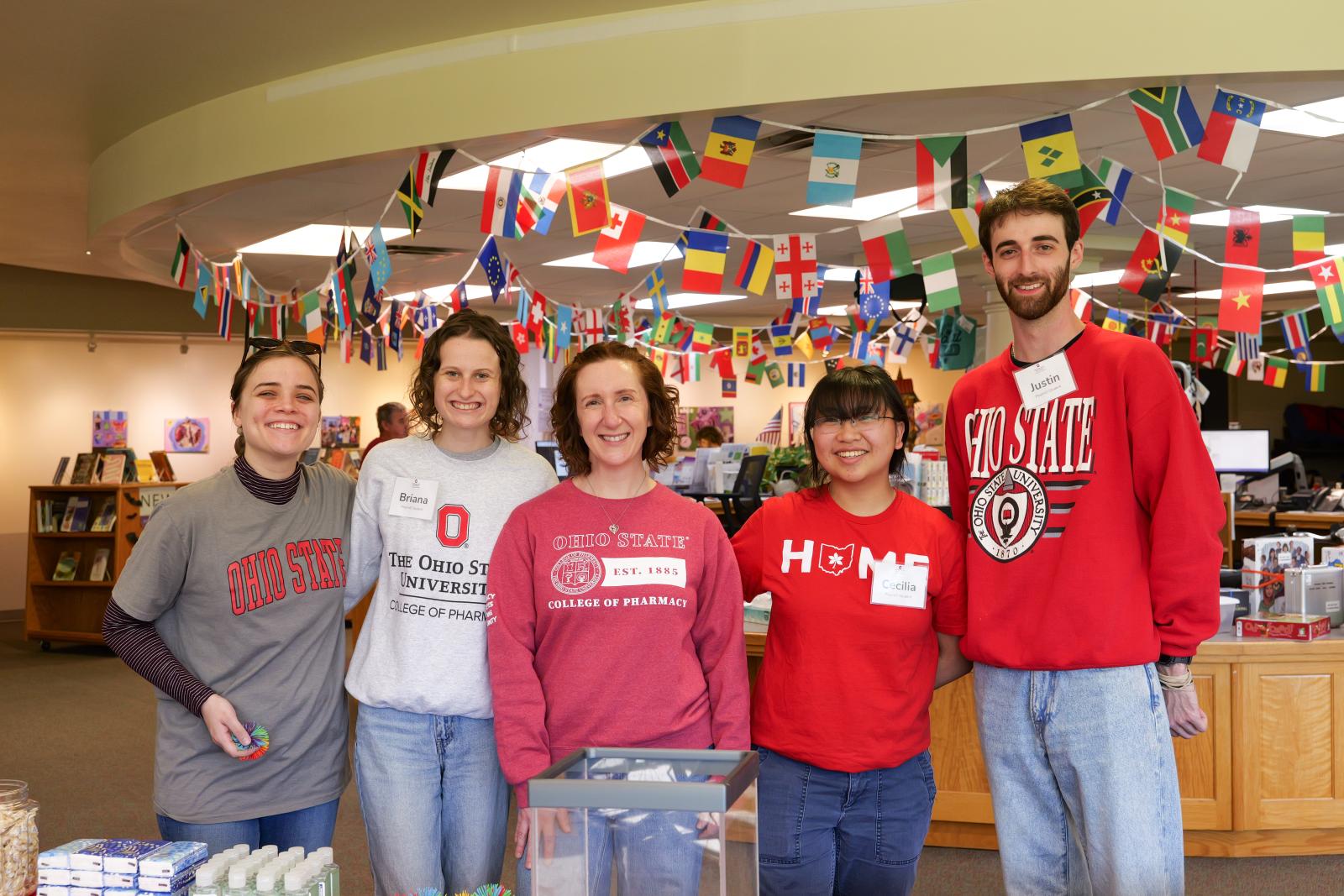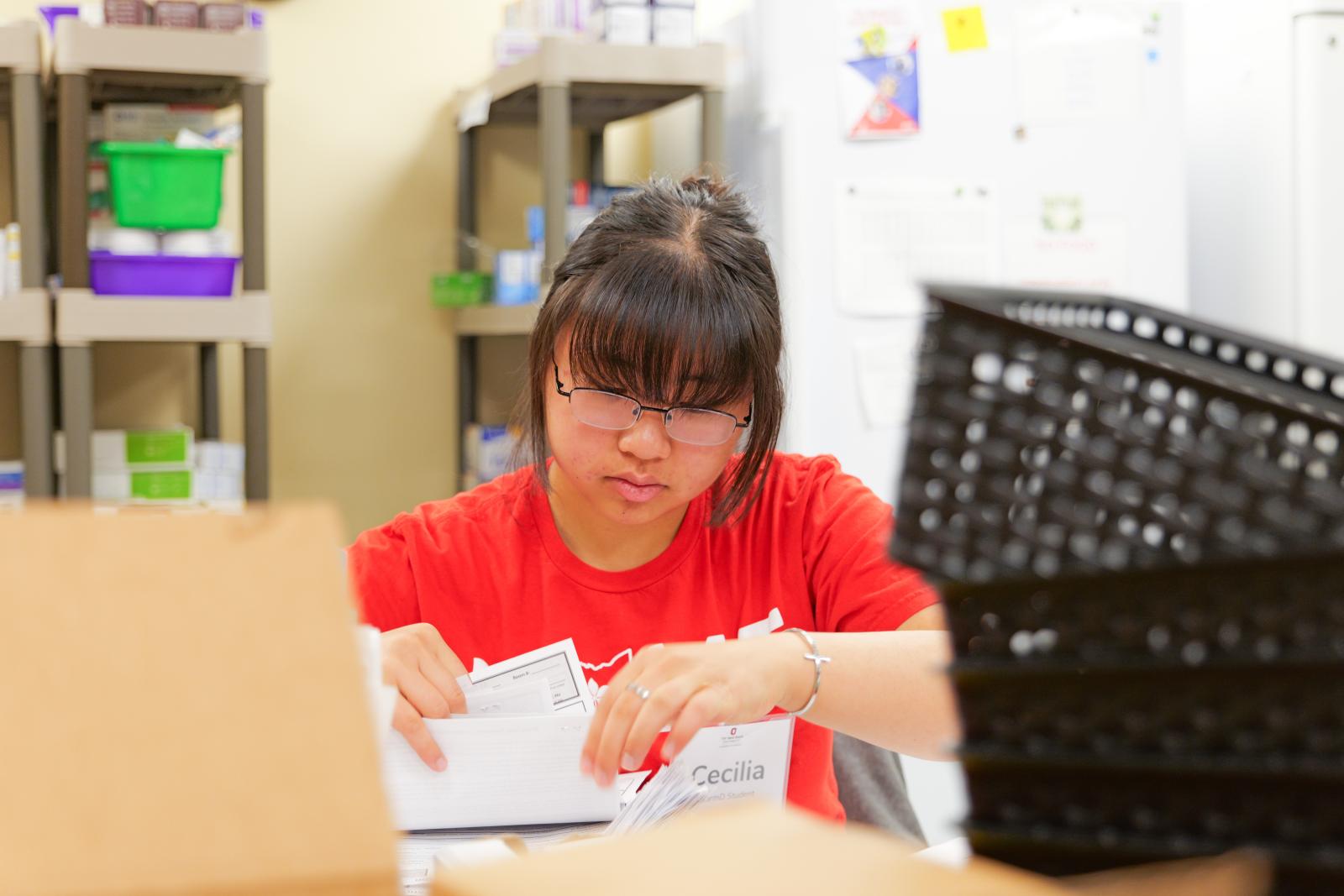PharmD students hit the road for Rural Appalachian Pharmacy Service-Learning course

This article was published in The Script Magazine – Autumn 2025.
“I’ve got an Eliquis,” a student shouts, holding a blister pack of light pink tablets above their head. Their announcement garners a wave of cheers throughout Rising Suns Nonprofit Pharmacy in Athens, Ohio, a charitable pharmacy that serves patients in rural southeast Ohio.
Packed into the pharmacy, PharmD candidates from The Ohio State University College of Pharmacy sort through hundreds of donated medications in the hopes of finding usable prescriptions. These students form the inaugural cohort of the Rural Appalachian Pharmacy Service-Learning (RAPS) course. All 15 of them skipped fall break vacations to spend October 16-18 in Athens for the course’s service-learning trip.
Throughout the seven-week course, students learned about rural communities in southeast Ohio, identified health needs in the area and designed outreach initiatives in response to those needs. The course culminated in this trip to Athens, where they implemented their outreach, shadowed pharmacy professionals across a variety of settings and assisted the community pharmacists at Rising Suns. This trip to Athens was also intended to increase student interest in rural experiential rotations.
“A lot of our pharmacy students do outreach and engagement events regularly through different student organizations, but this course offers them a completely new population and set of health challenges to learn about and help address,” said Rebecca Lahrman, PharmD, MS, BCACP, assistant professor and instructor of the RAPS course. “This experience is designed to show them how to identify meaningful ways to help their community and what professional opportunities exist as a pharmacist in a rural area.”
The RAPS course was created to support the goals of the college’s Pathways and Recruitment Opportunities for Pharmacy Exploration and Learning (PROPEL) project. Funded by a grant from the McKesson Foundation, PROPEL aims to improve PharmD graduates’ preparedness to provide care in rural and urban communities through experiential learning opportunities.
“No matter where you live and work, you will have patients who struggle with a range of social determinants of health,” Dr. Lahrman emphasized. “In rural and inner-city settings, we actually see a lot of the same problems, but the stories behind them are different, which necessitates different solutions.”
The course was co-instructed by Dr. Lahrman; Susan Nguyen, PharmD ’12, BSPS ’08, BCACP, associate professor; Christopher Hernandez, PharmD, BCACP, AAHIVP, assistant professor; and Jennifer Rodis, PharmD, FAPhA, professor and associate dean for outreach and engagement.

"This opportunity allowed me to develop a deeper understanding of the community health obstacles that I saw growing up and then allowed me a hand in addressing them."
Getting to know southeast Ohio
Students began the half-semester course by familiarizing themselves with the health and cultural landscapes of southeast Ohio. Their first step was to engage with readings, podcasts and movies about life in Appalachia. These pieces of anecdotal information discussed topics ranging from transportation struggles to the history of medical mistrust that exists in pockets of the community.
Instructors were intentional in providing students with data and anecdotes about the population before asking them to find solutions.
“We often see students who want to help folks in rural communities in southeast Ohio, and they have ideas about what health care can help,” Dr. Rodis said. “But meaningful engagement requires collaborative planning and connection with the community to learn from the people they intend to serve.”
Instructors encouraged students to move beyond health and demographic data to explore the full spectrum of health determinants. Over several weeks, students investigated the stories and lifestyles of residents in southeast Ohio, gradually uncovering insights into the health challenges and needs of the communities for which they were designing solutions.
“As pharmacy students, we know that there’s more hesitancy for immunizations in rural areas, so our first instinct might be to set up a free clinic with information on the vaccines offered,” said Ranean Sulebi, a P2 candidate in RAPS. “But that doesn’t consider what the patients actually need. They need information catered to their perspectives and solutions that consider their available resources. Taking the time to understand health challenges like we did ensures that you’re not trying to incorrectly solve a problem.”
Based on their research, students identified four areas to address through pharmacy outreach that fit their new understanding of the rural areas:
-
Vaccine education
-
Harm reduction
-
Cough, cold and over-the-counter items
-
Blood sugar testing
Students divided into small teams for each health care topic and developed outreach initiatives to implement on the service-learning trip. Sulebi was a part of the group that decided to develop cough and cold safety outreach. They prepared digestible information about the safe treatment of common colds and methods to keep germs at bay during the flu and cold season.
After workshopping their outreach plans with their classmates, instructors and partnering libraries in Athens and nearby Nelsonville, students took their tailored solutions to the field.

RAPS on the road
Throughout the service-learning trip, student groups rotated through Nelsonville, Glouster, The Plains and Athens public libraries, taking their outreach to the public.
At these locations, students provided information on their respective health care focus for audiences across age groups. Younger library patrons were offered gamified learning experiences with useful goody bags that included toys and tools to keep them healthy, like hand sanitizer and tissues. Adult patrons engaged in health care conversations with the student pharmacists and were referred to local resources, such as food banks, free health care centers and transportation centers, for continued support.
“Historically, a lot of grants or initiatives have come into rural areas to solve community problems, but they don’t continue that support once their time in the community is up,” explained Dr. Lahrman, who lives and practices in Athens. “We wanted to break that pattern and ensure that we were setting up community members with long-term solutions. That meant doing our research and connecting with resources that will continue to be accessible to people once our trip ended.”
Students bolstered one of these important community services by offering their time and pharmacy knowledge to Rising Suns.
“We are incredibly appreciative of the help we’re getting from these pharmacy students,” said Sarah Adkins, RPh, PharmD ’10, BCACP, pharmacist, co-founder and executive director of Rising Suns. “Besides helping us sort through donations, they also get a glimpse at how we fill prescriptions, work with patients who don’t have coverage, manage medication deliveries and figure out how to best support our patients.”

Along with Rising Suns, students shadowed pharmacists at O’Bleness Hospital and Appalachian Behavioral Health and assisted with vaccine administration at Shrivers Pharmacy.
“Part of our hope for this project is that our students can see just how important it is for health care workers and pharmacists to serve rural areas,” Dr. Rodis said. “There are significant challenges that arise as rural hospitals and pharmacies continue to close. Through the college's partnerships in the region, our students have opportunities to explore positions and find ways to be innovative in the provision of care for folks in rural health care deserts.”
After several days of community engagement and pharmacy exploration, students took the final week of the course to reconnect with their peers and instructors.
“I’m originally from a rural area in Appalachia,” said P2 candidate Maia Osborne. “This opportunity allowed me to develop a deeper understanding of the community health obstacles that I saw growing up and then allowed me a hand in addressing them. That was really amazing.”
RAPS co-instructors were thrilled to hear how impactful the students found the experience.
“During the service-learning trip, we interacted directly with preceptors and community members, hearing their stories about rural health care opportunities and challenges,” Dr. Nguyen said. “Having students experience what life and health care are like through someone else’s lens made this a holistic educational experience. We all gained an appreciation for the importance of local resources to a rural community.”
The trip’s success has even carried forward a few new initiatives. Students will return to Rising Suns in November and December of this year to offer additional assistance. Additionally, a new service-learning course in autumn 2026 will follow the same model but with a focus on inner-city communities.
“Bundling experiential learning and community engagement into a course creates a really unique opportunity for PharmD students to immerse themselves in a different environment,” Dr. Lahrman said. “It’s fantastic to see them put together the technical and interpersonal skills they’ve been learning to benefit communities that really need it.”